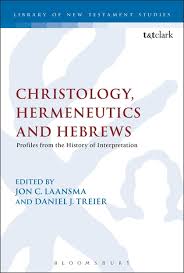Jon C. Laansma, "Hebrews: Yesterday, Today, and Future; An Illustrative Survey, Diagnosis, Prescription." In Christology, Hermeneutics and Hebrews: Profiles from the History of Interpretation. Library of New Testament Studies 423. Edited by John C. Laansma and Daniel J. Treier, 1–32. London, UK: Bloomsbury, 2012.
 Jon Laansma has provided a wonderful overview and contribution to the modern study of Hebrews. He provides a modern overview of history of interpretation and ways for scholarship to move forward.
Jon Laansma has provided a wonderful overview and contribution to the modern study of Hebrews. He provides a modern overview of history of interpretation and ways for scholarship to move forward.
I. Introduction
II. Survey: Hebrews in the Modern Period
III. Diagnosis: Hebrews within the Modern Research Program
IV. Prescription: Looking Ahead
Laansma observes modern approaches to Hebrews and concludes it is typically approached vis-a-vis historiography and historical research. Hence, it has not seen the amount of attention like James, or Paul, or the Gospels. Hebrews lacks an author, details about the audience, dating, etc. Therefore, historical questions have compartmentalized the document with the abundance of historical uncertainties.
However, looking forward, scholars can rekindle Hebrews scholarship by reading canonical texts as Christian Scripture and will restrict sole historical approaches (p.28). In order words, Laansma says the way to move forward is to add Theological Interpretation premises to ones interpretive enterprise—with, however, a warning to a pure and "simple return" to pre-critical readings (p.31).
So, scholars will approach Hebrews to learn how to read the Scriptures, as opposed to assuming the author's use of modern, grammatical-historical exegesis (p.31). Readers learn hermeneutical principles from Hebrews' use of the OT. The historical interpreter approaches the text acknowledging the "divine agency behind, with, around, and beyond the text, reader and world" (p.31).
In sum, how does the historical stalemate of Hebrews scholarship gain traction once more? Theological Interpretation of Scripture.
The critical difference in all these accounts of theological interpretation vis-a-vis the modernist tradition comes as soon as we open ourselves to these texts as divine speech; as soon as we find ourselves as participants within rather than solely scholars of these words and realities. The concern with history continues; indeed, the historical research that has worked to quench the spirt of anti-Judaism and has wine renewed appreciation for the roots of Christianity in Israel's story stands to open up a new place for Hebrews in all of historical and theological scholarship. Moreover, by virtue of our revised understanding of hebrews as divine speech, it instantly moves form the margins of interest to the center. (p.32)
